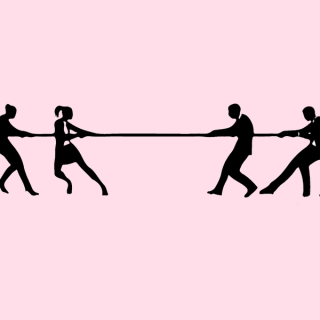
What Causes Our Minds to Zone Out?
When the part of the brain responsible for attention decides what’s going on externally isn’t really important, our thoughts and focus turn inward.

You’re talking to someone but your mind is in another place, probably having a conversation with someone else. Or, you’re watching a show and you think you’re paying attention to what is going on — but a few seconds later, you can’t even remember what happened in the last scene.
Yes, you zoned out. According to a study, our minds spend up to 13% of our waking time in offline mode — what we also know as zoning out and/or daydreaming.
This state can be defined as, “a shift of attention away from a primary task, toward internal information,” according to researchers Jonathan Smallwood and Jonathan Schooler. There are two levels to it: One, when you realize you’re not focusing on the task in front of you; and two, when you’re not aware of when you zoned out.
So, why does it happen? Smallwood, Ph.D., and reader in the Department of Psychology at the University of York, and Schooler, a psychologist from the University of California, Santa Barbara, may have an answer for it.
Zoning out is the result of “decoupling hypothesis,” they said in a research. It is defined as the time when the brain dissociates attention from outward sensations. Basically, it decides that nothing very important or dangerous is happening, and hence, ends up cutting the connection between what’s happening in the outside world with the inside world. Smallwood and Schooler believe this reconfiguration occurs in the brain’s locus coeruleus-norepinephrine (LC-NE) system, which is responsible for controlling attention and responding to stressful situations or external stimuli.
When zoning out, it’s not just your brains that undergo changes, but even the way your eyes move. Smallwood and Schooler found that under normal circumstances, your pupils will dilate when there are changes in your surroundings. However, when you’re zoned out, even your pupils will fail to respond to changes happening around you. “Instead, they fluctuate in size independently from their surroundings, as if marching to the beat of their own drum — or the mind’s drum,” reported LiveScience.
This brings us to the next question — is it good or bad to let our minds wander? Turns out, it is both.
Dr. Smallwood told the New York Times that humans are lucky to be able to mind-wander. He adds, “Imagine if you couldn’t escape mentally from a traffic jam?”
Smaller and Schooler found that creativity is one of the benefits of zoning out, as well. A 2012 study they conducted illustrates this: The researchers divided 145 people into four groups and asked them to come up with as many uses for daily objects such as clothes hangers, bricks, toothbrushes as they could in two minutes. The first group repeated the exercise instantly, and the other three groups were given a 12-minute break before they could start again. Among them, the first group was asked to rest, the second was given a hard memory task to complete and the third one was given a dull one to facilitate daydreaming.
Smallwood and Schooler found the group that performed the tedious task did better and came up with 41% more possibilities suggesting that daydreamers had been ruminating on the first test for 12 minutes between the exercises thinking about uses that they may have initially skipped.
Related on The Swaddle:
Why You Can’t Shut Your Mind Off Even When You Know You Need to Sleep
Smallwood and Schooler also found creativity to be at its peak when you zone out completely. This is probably because being unaware of the fact that your mind is wandering off, you are facilitating deeper thinking reportedDiscover Magazine.
The downside of zoning out exists, write psychologists from Harvard University Matthew Killingsworth and Daniel Gilbert for The Harvard Gazette, because “a human mind is a wandering mind, and a wandering mind is an unhappy mind.” This is because, they added, “the ability to think about what is not happening is a cognitive achievement that comes at an emotional cost.”
In addition to making us unhappy, zoning out also causes us to forget what we’re doing. In a 2010 study, researchers found that the more one daydreams, the worse their ability to remember tasks becomes. To reach this conclusion, researchers gave participants a list of words and then asked them to think about different memories from their life. Then, the researchers questioned them about the original list of words. They found that participants forgot more words when they were asked to recount memories of their parents’ homes in comparison with their current home and also when they were made to think about an international vacation versus a domestic vacation. Therefore, concluded the researchers, the farther the memory in time or space, the greater was its amnesic effect.
So, zoning out, per se, is not a bad thing. Whether it’s good or bad will depend on the timing and what you’re thinking about. For the timing part of it, zoning out may be good if you’re sitting in the park, idle — with nothing to do, when it may result in a bout of creativity. But sitting through a business presentation and not remembering any of it may put you in a difficult spot if you’re asked to recount any of the points or take the presentation ahead when you don’t know at which point the earlier presenter left off.
Coming to the content of your thoughts, our mind often does ruminative thinking. And, “the thing about rumination is that, by its nature, it is a reflection that doesn’t lead anywhere — it’s just a vicious cycle,” The Swaddle has reported earlier. Sometimes, it is used as a coping mechanism to stop yourself from thinking about the immediate pain or suffering. It also gives us the feeling that we’re on top of a task when we’re thinking about it. However, “The problem is, of course, that most of the time we’re ruminating on unsolvable problems: things that have already happened, that we can’t go back and change,” The Swaddle reported. Therefore, it would only help to become aware of the pattern — for instance, when do you ruminate, what are some of the most typical thoughts you ruminate about — to get yourself out of this vicious loop of negative thoughts.
Anubhuti Matta is an associate editor with The Swaddle. When not at work, she's busy pursuing kathak, reading books on and by women in the Middle East or making dresses out of Indian prints.
Related


By 2030, More than Half of South Asian Youth Will Lack Employable Skills: UNICEF
